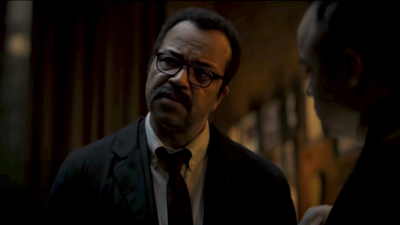Writer/director Matt (Let Me In) Reeves' The Batman is a hefty and somber piece of cinema, a throwback to Christopher Nolan's Dark Knight trilogy, but with a Gotham-early-years angle, which includes a new kid on the block, the moody and brooding (James Dean-ish) Robert (Twilight) Pattison.
The Batman is also Batman: Year One (okay, more so Year Two, with allusions to Hush, Mask of the Phantasm and The Long Halloween), but with its own twist, as it also emphasizes the Riddler's entrance as the inquisitive, Bane/Zodiac-like, Edward Nashton (or is he?), portrayed by the ultra-edgy Paul (The Good Heart) Dano. Along the illicit way come big-time criminals, the Penguin, aka Oswald Cobblepott (aka Oz), played by the unrecognizable Collin (Daredevil) Farrell, and Carmine Falcone, played by John (Secret Window) Turturro.
Through the Riddler's nudges (fierce and as one comes to learn, distinguished by clever duality), the story (co-composed by Peter {The Hunger Games} Craig) unveils perceived police corruption, but through this claim, the classic villain creates great, contradictory dilemma, leaving Bruce Wayne no choice but to crush his vexing adversary before more casualties occur.
Zoe (Fury Road) Kravitz's Selina Kyle/Catwoman slinks into the mayhem to lend a helping claw: sexy, sweet and upon occasion, as enigmatic as the Riddler, with intriguing links to Cobblepot and in particular, Falcone. There's distinct chemistry between Pattison and Kravitz, which makes the mythic romance between Bat and Cat feel like something that's always been there and always will be. That's what faithful fans desire.
The same can be said of the bond between Wayne and Jeffrey (James Bond/Westworld) Wright's commendable James Gordon. The policeman is a conscientious agent who, like the rising Dark Knight, wants to nab the Riddler and the sooner, the better.
To solidify the movie's camaraderie, Andy (Planet of the Apes/Lord of the Rings) Serkis' Alfred Pennyworth gives Wayne the guiding light he needs to rise from out the dark to accomplish his mission. Serkis' portrayal is essayed much in the manner of Michael Caine's in the Dark Knight trilogy and Sean Pertwee's on Gotham: careful, parental and guru-like (ideal traits to mold an ideal vigilante).
In light of the aforementioned attributes, it may appear that The Batman is a message movie. Perhaps it is, but then so are most police dramas, no matter the uniforms featured. These productions promote the need to make society just and noble when circumstances dare to crumble, and sometimes, as one discovers in Sidney Lumet's Serpico (and for that matter, Oliver Stone's JFK, which The Batman sometimes mirrors), they reveal an unexpected festering beneath their bases. The Batman is no exception to that respectable rule.
Even with this said, The Batman's slant isn't as overtly conservative or philosophical as Nolan's epic chapters, but again the same somber tone prevails in its detective-noir context: always earnest, angry and crusade-ridden (rather like Reeves' Planet of the Apes entries, now that I think of it). That Reeves keeps the pensive ingredients in check solidifies the story's impact, and clocking in at three hours, it streams, punches and roars (thanks in large part to a cool, Batmobile prototype in a Pengy, Bullitt-fueled chase and Michael {Spider-man: No Way Home} Giacchino's death-marching, Ave Maria-laced score). It all builds razor-sharp tension from beginning to end.
For the sake of another Batman re-introduction, this one works: never too rehashed and never too reinvented. Well-rounded Caped Crusader fans will demand a "next year" sequel, which is unquestionably in the works, as its sinister, Arkham cameo joyously conveys.
















The (3/24) deleted Joker scene is gripping. It establishes a relationship between Batman and Joker prior to the Riddler's full-fledge rise. A prequel could be made based on the deleted footage, but I suspect a Riddler/Joker all-out team-up is more likely.
ReplyDelete